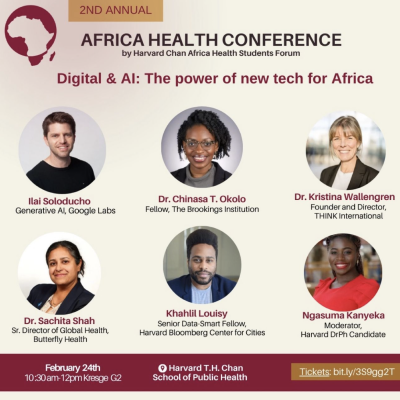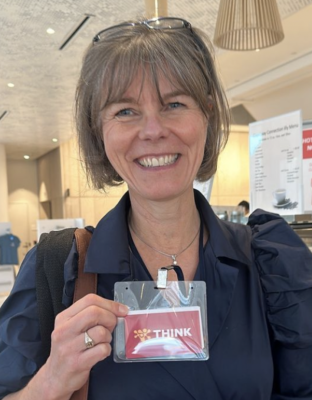By Ziyuan Aria Zhou
 The Africa Health Conference, hosted by the Harvard T.H. Chan School of Public Health, serves as a platform for discussing and disseminating the transformative initiatives shaping the healthcare landscape across the African continent. Under the theme ‘Mapping Changemakers Transforming Health in Africa’ this year, the conference explored a range of critical themes that capture the complexities of Africa’s healthcare challenges and triumphs. It aimed to highlight the ground-breaking innovations and effective policies that have significantly improved health outcomes in various African communities.
The Africa Health Conference, hosted by the Harvard T.H. Chan School of Public Health, serves as a platform for discussing and disseminating the transformative initiatives shaping the healthcare landscape across the African continent. Under the theme ‘Mapping Changemakers Transforming Health in Africa’ this year, the conference explored a range of critical themes that capture the complexities of Africa’s healthcare challenges and triumphs. It aimed to highlight the ground-breaking innovations and effective policies that have significantly improved health outcomes in various African communities.
The conference was infused with a diverse group of actors – including healthcare professionals, policymakers, researchers, technologists, and innovators – all united by a common goal: to transform health outcomes across the African continent.
Our founder and Global CEO, Dr Kristina Wallengren, represented THINK at the conference. Kristina was an expert speaker on the panel ‘Digital & AI: The Power of New Technology’ and elaborated on the significant strides made by THINK since 2019 in utilising AI for tuberculosis screening – having screened 20,000 people within a short span of 9 months.
This approach not only illustrates the potential of AI in early disease detection and intervention, but also underscores its broader applicability in diagnosing various conditions through the analysis of massive data sets – from imaging to electrophysiology. The example of AI-enhanced stethoscopes and their application in pregnancy and foetal monitoring further emphasise the transformative power of AI in enhancing diagnostic capabilities in resource-limited settings, a critical advantage for the African continent.

“We cannot change the world on our own, so we need to collaborate with people, teach people, and avoid keeping our valuable information in an echo chamber,” says Kristina.
THINK’s endeavours in utilising AI for TB screening and enhancing data-driven decision-making in healthcare programs have set a benchmark for innovation in the healthcare sector. Kristina’s insights into these areas not only highlighted THINK’s contributions, but also emphasised the importance of digital and AI technologies in addressing complex health issues.
Additionally, THINK’s participation underscored the critical need for AI literacy and capacity building within the healthcare workforce, a realisation that could shape their future projects and collaborations. The insights gathered from discussions on ethics, regulation, and the positive reception of AI technologies among healthcare professionals enriched THINK’s perspective on how to navigate the complexities of introducing AI in health contexts.
Moreover, Kristina shared her experiences and the rationale behind leveraging AI in decision-making processes for healthcare programs. Drawing from her extensive consultancy work in epidemiology, she highlighted the disconnect between data generation and its application in healthcare decision-making. The incorporation of AI, particularly large language models like ChatGPT, in bridging this gap presents a promising avenue for enhancing program implementation and facilitating data-driven decision-making across healthcare systems.
 As Kristina explains, “This way of using AI – and I mean simply off-the-shelf ChatGPT – will bridge the gap between the data and the decision-makers, and we will be able to prioritise our limited resources and make decisions on effective interventions to apply them where they will make a difference effectively. This is the opportunity to improve the quality of our healthcare programmes by making the right decisions.”
As Kristina explains, “This way of using AI – and I mean simply off-the-shelf ChatGPT – will bridge the gap between the data and the decision-makers, and we will be able to prioritise our limited resources and make decisions on effective interventions to apply them where they will make a difference effectively. This is the opportunity to improve the quality of our healthcare programmes by making the right decisions.”
While expressing a hopeful outlook on the future of AI in healthcare, Kristina did not shy away from addressing the potential challenges. The ethical and regulatory considerations of AI deployment, coupled with the need for AI literacy among healthcare professionals, are pivotal concerns. Yet, Kristina sees AI as a transformative tool designed to elevate the quality of healthcare delivery. By shifting the focus from quantity to quality, AI embodies the potential to revolutionise healthcare practices, making quality healthcare accessible and efficient across Africa. “It is important to remember that AI is a tool – and that the human is in the driver’s seat,” Kristina reminds us.
The purpose of attending the conference was to share and inspire like-minded people, and to encourage others to collaborate with THINK. As Kristina says,
“I am an incurable optimist. I believe we have endless opportunities to improve the quality of our work and, therefore, the quality of life.”
